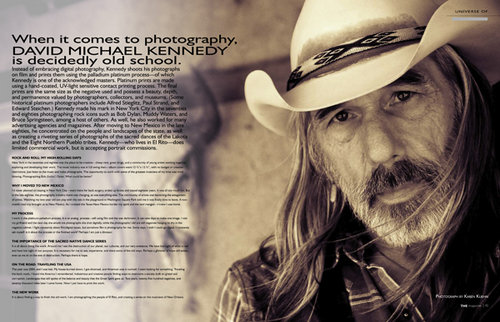June 1, 2011
Press Articles :: The Magazine June 2011

UNIVERSE OF
| june 2011 THE magazine | 43
Photograph by Karen Kuehn
When it comes to photography,
David Michael Kennedy
is decidedly old school.
Instead of embracing digital photography, Kennedy shoots his photographs
on film and prints them using the palladium platinum process—of which
Kennedy is one of the acknowledged masters. Platinum prints are made
using a hand-coated, UV-light sensitive contact printing process. The final
prints are the same size as the negative used and possess a beauty, depth,
and permanence valued by photographers, collectors, and museums. (Some
historical platinum photographers include Alfred Stieglitz, Paul Strand, and
Edward Steichen.) Kennedy made his mark in New York City in the seventies
and eighties photographing rock icons such as Bob Dylan, Muddy Waters, and
Bruce Springsteen, among a host of others. As well, he also worked for many
advertising agencies and magazines. After moving to New Mexico in the late
eighties, he concentrated on the people and landscapes of the state, as well
as creating a riveting series of photographs of the sacred dances of the Lakota
and the Eight Northern Pueblo tribes. Kennedy—who lives in El Rito—does
limited commercial work, but is accepting portrait commissions.
Rock and Roll: My High-Rolling Days:
New York in the seventies and eighties was the place to be creative—cheap rent, great drugs, and a community of young artists working together,
exploring and developing their work. The music industry was in full swing then—album covers were 12 .”x 12 .”, with no budget or creative
restrictions. Just listen to the music and make photographs. The opportunity to work with some of the greatest musicians of my time was mind
blowing. Photographing Bob (fuckin’) Dylan. What could be better?
Why I moved to New Mexico:
I’d never planned on staying in New York City—went there for back surgery, ended up broke and stayed eighteen years. It was all too much fun. But
in the late eighties, the photography industry there was changing, as was everything else. The community of artists was becoming the antagonism
of artists. Watching my two-year old son play with the rats in the playground in Washington Square Park told me it was finally time to leave. A twomonth
road trip brought us to New Mexico. As I crossed the Texas-New Mexico border my spirit and the land merged—I knew I was home.
My Process:
I work in the platinum-palladium process. It is an analog process—still using film and the wet darkroom. It can take days to make one image. I visit
my girlfriend and the next day she emails me photographs she shot digitally, while the photographs I did are still negatives hanging to dry in the
negative cabinet. I fight constantly about film/digital issues, but somehow film is photography for me. Some days, I wish I could go digital. I constantly
ask myself: is it about the process or the finished work? Perhaps I am just a dinosaur.
The Importance of the Sacred Native Dance series
It is all about doing the work. Around me I see the destruction of our planet, our cultures, and our very existence. We have lost sight of what is real
and have lost sight of our purpose. It is necessary for me to see, experience, and share some of the old ways. Perhaps a glimmer of hope still exists,
even as we sit on the eve of destruction. Perhaps there is hope.
On the Road: Traveling the USA:
The year was 2004, and I was lost. My house burned down. I got divorced, and American was in turmoil. I went looking for something. Traveling
the back roads, I found the America I remembered. Industrious and creative people finding ways to overcome a society built on greed and
corruption. Landscapes that still spoke of the balance and beauty that the Great Spirit gave us. Two years, twenty-five hundred negatives, and
seventy thousand miles later I came home. Now I just have to print the work.
The New Work:
It is about finding a way to finish the old work. I am photographing the people of El Rito, and creating a series on the musicians of New Orleans.

